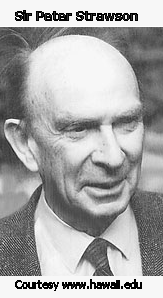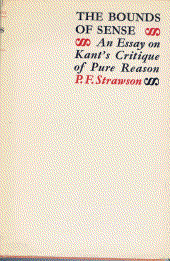 It
is this (in Strawson's terms):
It
is this (in Strawson's terms):At the end of the course we come to challenge the root idea we encountered at the beginning. Descartes' foundational certainty was that I can know that I am having an experience, namely that I am 'thinking'. Kant argues that I cannot have any experiences at all unless I think of myself as belonging to an objective world.
By an objective world I mean a world in which there are things besides myself which exist independently of me.
This thesis, that to have experiences at all I must think of myself as belonging to an objective world, is conveniently called the objectivity thesis.
 It
is this (in Strawson's terms):
It
is this (in Strawson's terms):
"... experience must include awareness of objects which are distinguishable from experiences of them in the sense that judgements about these objects are judgements about what is the case irrespective of the actual occurrence of particular subjective experiences of them ..."
Strawson, The Bounds of Sense, London, 1966, Methuen, p.24.
This is where Kant wants to get to.
Nobody much thinks he gets there. But everybody thinks it is brave try, and one that took philosophical enquiry to a new level almost, by pursuing new questions in novel ways.
If Kant's argument is seen to be unconvincing, it is not because it is clearly flawed. The difficulty is that it is not clear at all. I can't simply lay it out and ask you to evaluate it. The passages where it is presented are powerfully obscure. All I can do is to say a little bit about what Scruton calls the flavour of the argument, picking up some of the Kantian arguments that we have already explored a little and leaving you with the task of working out how you might construct a fully developed and linked-up chain of argumentation for the stated conclusion.
 If
all I can do is to convey a flavour, let me start with Kant's argument about
causality, and argument which perhaps is clearer than most.
If
all I can do is to convey a flavour, let me start with Kant's argument about
causality, and argument which perhaps is clearer than most.

Kant tries to establish the following thesis: Without the concept of causality we would not be able to make the distinction between ourselves and the external world.
We would not be able to treat some of our experience as figments and some as perceptions of a world independent of us.
His idea was that to make this distinction there have to be two possible orderings of experience.
One is the one they occur in to us. The other is the one they occur in independently of us ...
How so?
Think of what it is like first looking at a house. We stand and look, and as we look we see the front door, the windows on either side, the first floor windows, the roof, the chimney. Imagine that we are not seeing these things all at once. Our eye, our attention, roves over the house, giving us a succession of visual experiences - the door, the windows, the first floor, the roof.
Then contrast that experience, or sequence of experiences, with this one. You are on the bank of a river watching a boat go by.
What governs the order in which we have these experiences? When we look at the house, we can to an extent choose - we can look at the roof first and then the chimney, or we can look at the door and then the roof and then the chimney etc.
But in the case of the boat going by, it's not up to us in the same way. The
order is fixed by the world outside us. We see the front of the boat first because
it is the first to appear. And so on.
Kant makes the point that we couldn't make this distinction, the distinction between some experiences that are ordered by ourselves and some that are ordered independently of us unless we acknowledged the concept of causation. If we didn't have that concept we wouldn't be able to make the distinction. We wouldn't be able to attribute some experiences to the external world and some to changes in us.
Our belief that there is such a thing as causation enables to think of some sequences of experience as determined outside us. It enables us to have the concept of an external reality.
This is very interesting and suggestive, but as I have presented it I expect you will think that it doesn't get us to where Kant wants to get us to. It might show that our experience would be very different without the concept of causality, but it doesn't show, does it, that we wouldn't be able to have experience at all... - ?
In working towards the objectivity thesis itself some contributory theses, perhaps besides the causality one, are formulated or relied on tacitly.
Here is one contributory thesis:
"... experience essentially exhibits temporal succession..."
(Strawson,The Bounds of Sense, London, 1966, Methuen, p.24.)
This is not argued for by Kant. He assumes it is true.
We have already discussed whether it is contestable - and I don't know what conclusions you have on reflection drawn.
Mystics make claims of atemporality for their experiences.
Christian thought has the concept of 'Eternity' which suggests perhaps the possibility of experience occurring but not within the framework of temporality.
The Christian God is held to be outside time - the doctrine to be found in St Augustine, for example.
But Kant's assumption is that we cannot understand what atemporal experience would be like.
Here is another contributory thesis, the thesis of the necessary unity of consciousness:
"There must be such unity among the members of some temporally extended series of experiences as is required for the possibility of self-consciousness, or self-ascription of experiences, on the part of a subject of such experiences."
(Strawson's formulation, The Bounds of Sense, London, 1966, Methuen, p.24.)
In clarification of this thesis:
It is the claim that for there to be experience a subject has to have it.
We considered the argument that the Cogito went too far when it concluded that I exist. All it shows it is sometimes argued, is that ‘there is a thought’, ‘there is doubt’.
Could there be an experience without it being the experience belonging to something?
Kant argues that there couldn’t: that to be an experience it has to be owned by an experiencer.
I am owning the experience I get when I look at the wall when I say ‘I’ am seeing the wall.
‘I’ am feeling sick.
‘I’ am hearing the birds.
Scruton puts it like this:
'... there is contained in every thought, as of every mental content, the notion of a subject.' (A Short History of Modern Philosophy, London, 1981, Routledge, p.142.)
Mrs Gradgrind in Hard Times is reported as believing on her deathbed that there was a pain somewhere in the room, but not that it was hers. Such a state of affairs was regarded by Kant as unintelligible. There can’t be an experience that does not ‘belong’ to a subject – an ‘experiencer’. (Scruton, History, p.142; or his Kant, p.32.)
I have not said what his argument for this conclusion is. I am just trying to explain what the claim is. The argument comes later.
We are talking here of the self. Kant is saying, if I can put it in a horribly confused way, that I have to have the concept of 'myself', who I think of as having any experience I am having, in order for me to have it.
Now for the thesis of objectivity itself:
 The
thesis of objectivity
The
thesis of objectivityReminder:
"... that experience must include awareness of objects which are distinguishable from experiences of them in the sense that judgements about these objects are judgements about what is the case irrespective of the actual occurrence of particular subjective experiences of them ..."
(Strawson, The Bounds of Sense, London, 1966, Methuen, p.24.)
It is connected to the thesis of the necessary unity of consciousness in the following way:
You can't have unity of consciousness unless you think of your experience as experience of an objective world.
There is a connection in other words between thinking of your experience as yours - as you must do, according to Kant - and thinking of yourself as experiencing a world which is actually there, independently of you.
The connection is: you can't have the second unless you have the first.
Let me try and put it again:
Begin with the thought that there are a number of experiences.
The first point is:
You can't think of these as existing independently of an experiencer. They have to be owned.
Roger Scruton is clear and brilliantly concise: Kant,
Oxford, 1982, OUP, p.33 ff. |
The second point is:
You can't think of a set of experiences as owned by a single experiencer - as 'mine' - unless you think also that some of these experiences are experiences of an objective world, a world that exists independently of you.
Is this just another way of putting Kant's claim?: Being an experiencer - a subject - is only possible in an objective world. Here is a note about two ways of interpreting Kant's major claims - the 'austere' and 'meaty' interpretations. |
If the objectivity thesis is as formulated, we really do have to ask now: What argument is there for it?
Strawson hints at an argument when he says:
"For a series of diverse experiences to belong to a single consciousness it is necessary that they should be so connected as to constitute a temporally extended experience of a unified objective world." (Strawson, The Bounds of Sense, London, 1966, Methuen, p.97.)
Can this hint be developed?
The situation is this.
We ordinarily believe we live in a world that is independent of us - the 'objective' world.
This is the ordinary belief that Descartes destabilized, by talking of the inner world of experience through which alone he supposed we gained access to the 'external' world. It is the world everyone except Berkeley thought Berkeley was denying.
Kant attempts to argue that we couldn't have any experience at all unless we
owned our experiences
and we would not be able to own experiences unless we
conceived of ourselves as belonging to an objective world
What more bits of argumentation can be got out of the Transcendental Deduction which help put flesh on this bare outline?
We have already discussed the first point, that for experience to be possible there needs to be a unity of apperception.
I'm not sure what argument for it is possible, or necessary. May we say: "the contrary is inconceivable"?
The next question is: what is the argument for concluding that we would not be able to own our experiences unless we belonged (or conceived of ourselves as belonging) to an objective world?
Answers on a postcard, please.
Philosophy in the 17th and 18th Centuries Home
Prepared by VP
Revised 09:03:04